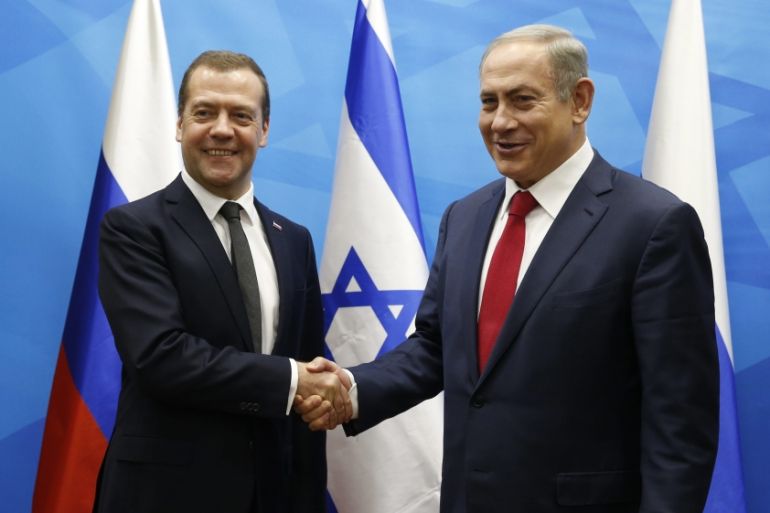Israel: Iran should not base itself militarily in Syria
Israeli PM says he will not allow Iran to turn neighbouring Syria into a base of military operations.

Israeli Prime Minister Benjamin Netanyahu has said he will not allow Iran to turn neighbouring Syria into a base of military operations and vowed to limit the Islamic Republic’s influence in the war-ravaged country.
|
|
“We are determined to … prevent Iran … from establishing itself militarily in Syria, on the ground, in the air or at sea,” Netanyahu said as he held talks with his Russian counterpart Dmitry Medvedev in Jerusalem on Thursday.
“We are also determined to prevent it from bringing about the establishment of Shia militias, which it is organising, and of course, the arming of [Lebanese] Hezbollah with dangerous weapons aimed at us.”
Thousands of Iranians and members of the Shia armed movement Hezbollah are in Syria fighting alongside government troops against Sunni rebels.
They have provided crucial support to President Bashar al-Assad’s overstretched and exhausted army, and have played a significant role in the latest battle for eastern Aleppo.
In April, Netanyahu publicly admitted that dozens of convoys transporting weapons to Hezbollah had been attacked.
Last year, Netanyahu and Russian President Vladimir Putin agreed to set up a “hotline” to avoid accidental clashes.
Fighting terrorism
Netanyahu also called Israel and Russia “partners in the war on radical Islamic terror” and noted that the two countries along with the United States and others “share the goal of eliminating” the Islamic State jihadist group.
Medvedev agreed that Russia and Israel were facing the “common challenge” of terrorism, adding that “we must stand together against it”.
The Syrian civil war started as a largely peaceful uprising against President Assad in March 2011, but quickly developed into a full-scale war.
Russia launched an air campaign in support of Syrian government forces last year, which has been widely credited with helping turn the balance of power in favour of Assad.
Since then, at least 9,364 people have been killed and a further 20,000 civilians have been wounded.
Earlier this year, the UN special envoy to Syria, Staffan de Mistura, estimated that at least 400,000 people had died over the past five years.
Medvedev began his trip to Israel and the Palestinian Territories on Wednesday. He is due to meet Palestinian President Mahmoud Abbas in Jericho on Friday.
In September, Russia had expressed a willingness to host Israeli-Palestinian peace talks, though no date was officially agreed on by all of the parties involved.
In light of cooled relations with the US and the European Union, Israel has increasingly turned towards forging bonds with Russia.